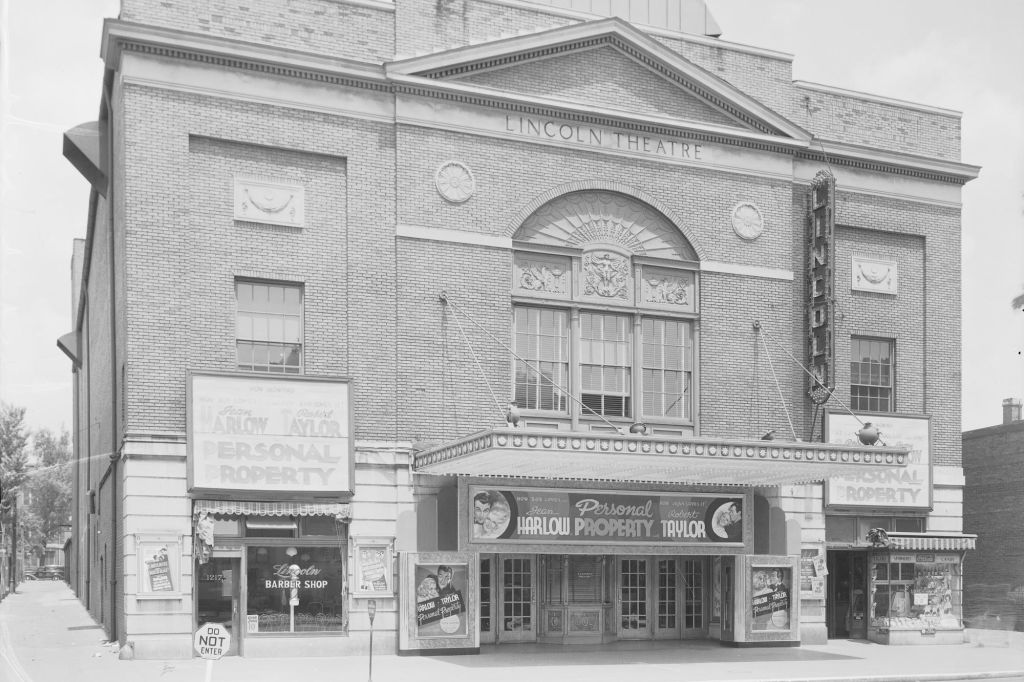Music
 Lincoln Theatre. Photo from Scurlock Studio Records, Archives Center, National Museum of American History. Smithsonian Institution.
Lincoln Theatre. Photo from Scurlock Studio Records, Archives Center, National Museum of American History. Smithsonian Institution.
“The Jewel of U Street”: Celebrating Black Broadway + Lincoln Theatre’s Rich History
February 18, 2022 @ 2:00pm
In celebration of Black History Month, the Lincoln Theatre will host Remembering Black Broadway at the “Jewel of U Street,” a discussion detailing the work of author Briana Thomas. Thomas’ book, “Black Broadway in Washington, D.C.” is a historical retelling of the history of Black culture and performance art on the U Street corridor. A journalist by trade, Thomas will detail her process documenting the cultural developments of D.C.’s history of Black performance art, in addition to her personal ties to Black Broadway.
The conversation will be followed by a live performance of The Bohemian Caverns Jazz Orchestra. Otherwise known as the “Jewel of U Street,” the Lincoln Theatre was a pivotal venue during the rise of Black Broadway and remains an integral part of the District’s exploration of fine arts. Ahead of Remembering Black Broadway at “The Jewel of U Street,” which is co-presented by the DC Commission on the Arts and Humanities, District Fray sat down with Cherise Rhyns, general manager of the Lincoln Theatre, to discuss the significance of performance art in the nation’s capital.
The Lincoln Theatre was founded in 1922 and recently celebrated its 100th anniversary. Since its establishment, the venue has hosted an impressive list of notable performers, including Duke Ellington, Ella Fitzgerald and Cab Calloway. During the early 20th century, the Lincoln Theatre was a cultural safe haven for D.C.’s Black community during an era where segregation persisted across the country. In particular to D.C., Rhyns explains the U Street corridor became a thriving music and arts district for serving the Black community when D.C. was segregated.
During this dark era of American history, the Lincoln Theatre became a beacon of light for the District’s African American residents, ultimately becoming the first gem along the section of U Street named Black Broadway, she says. Between the U Street corridor, Shaw and Cardozo, this “strip of commerce was so significant in shifting the lifestyles of African Americans in the District,” Rhyns says.
The establishment of the Lincoln Theatre not only resulted in the creation of a dedicated space for entertainment, but was also a vital source of employment for members of D.C.’s Black community.
Furthermore, the opportunity for Lincoln Theatre to host this conversation with Thomas — and articulate the District’s rich African American history through the lens of Black Broadway — is the very reason why Rhyns believes it is so important to organize this discussion during Black History Month.
While people should continue to learn about African American history every month, she hopes the additional interest generated by Black History Month will “spark people to read Briana’s book and [embark on] tours the city does to [gain] a deeper dive into the history of U Street, Shaw and Cardozo.”
Remembering Black Broadway at the “Jewel of U Street” will be held at the Lincoln Theatre on Saturday, February 19 at 6:30 p.m. Register here for the free event.
Lincoln Theatre: 1215 U St. NW, DC; 202-888-0050; thelincolndc.com // @thelincolndc







